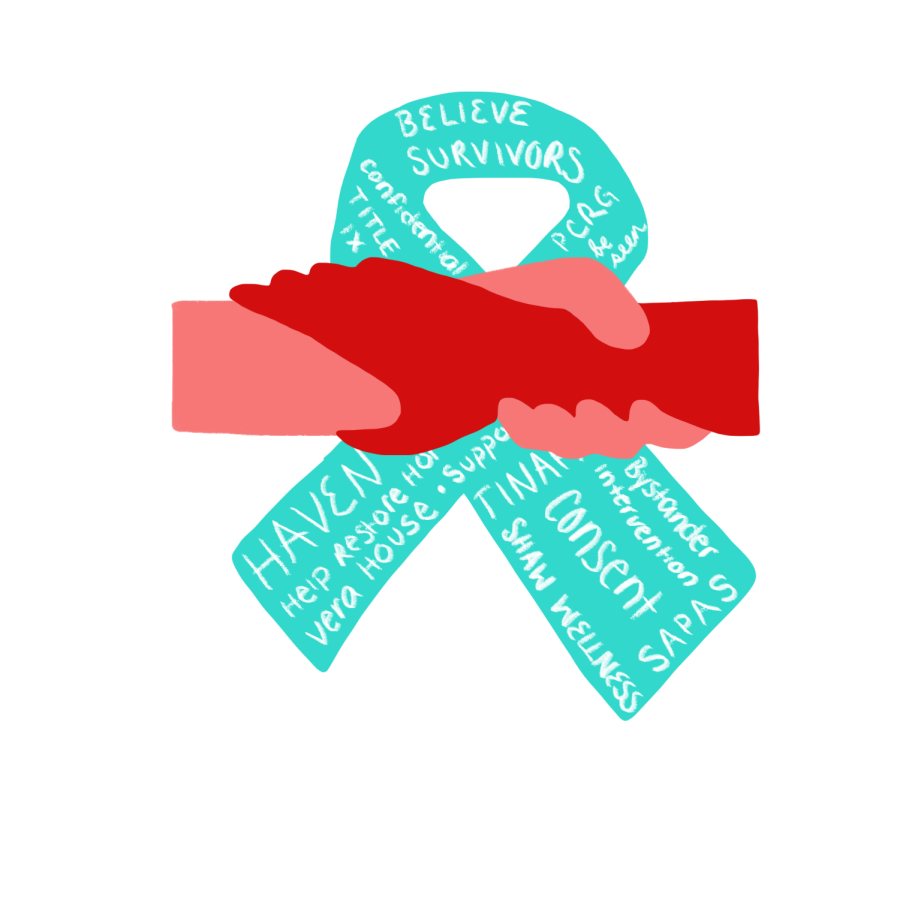Survivor Resources Within and Beyond Colgate
Colgate harbors a plenitude of resources addressing sexual violence prevention, whether it be inspiring student and faculty activists or response centers on and off campus. However, it is crucial that the Colgate community actively supports these resources and other initiatives to stop the prevalence of sexual violence on campus.
Survivor resources consist of multiple dimensions and taking action can be interpreted in a multitude of ways. One factor attributed to the survivor experience is the decision on whether or not to report an experience. The Prohibited Conduct Response Group (PCRG), founded in 2020 in response to the new Title IX regulations and formerly known as the Equity Grievance Panel (EGP), which emerged in 2012, acts as the conduit for this type of support for those who seek it. Several professors currently serve on the PCRG, including Frank Frey, Professor of Biology and Environmental Studies and Chair of the Biology Department, who served on the EGP since 2013.
“Sexual violence and discriminatory harassment are deeply personal and traumatic experiences,” Frey said, “I agreed to serve because I wanted to be trained in how best to support students, learn how to provide the resources that they need and do my own small part to ensure that students never feel alone and are receiving the best and most accurate information as they make decisions.”
New Title IX regulations have not affected community values, according to Frey; they did however require changes in policy, as the regulations themselves are more restrictive when defining what constitutes specific violations.
Frey notes that “the distinction between what is considered a ‘Title IX Violation’ and a ‘University Standards Violation’ has nothing to do with the severity of the alleged violation or Colgate’s commitment to investigate and resolve all complaints of Prohibited Conduct, but instead solely depends on whether the alleged violation falls within the restricted scope of definitions from the federal government.”
However, faculty members plan to uphold community values above all else in spite of these adjustments in policy and procedure. For further questions about the changed policies from Title IX regulations and the functions of the PCRG, Frank Frey welcomes students to contact him or the other PCRG members available on the Colgate University website.
In addition to support from faculty members on campus, student support is offered as well. The Shaw Wellness Institute offers a plethora of resources, most notably Bystander Intervention Trainings, which focus on addressing sexual violence prevention on campus and providing the tools necessary to learn how to be an active bystander. The training offered through Shaw is divided into two parts, Bystander 1.0 and Bystander 2.0. The distinction between these two trainings is important in navigating an understanding of sexual violence on campus, according to senior Keelah Dixon, a member of the Bystander program and also a Shaw Wellness Ambassador.
“Bystander 1.0, which I train, is required for all first-years. Bystander 2.0 is more tailored to addressing sexual violence that occurs in organizations [on campus],” she explained.
From her time working with the Bystander program, Dixon hopes that having these trainings can raise more long-term awareness about sexual violence on campus. She acknowledges that the presentations themselves may not be perfect, but says Bystander trainers are open to criticism in order to make the program as survivor-centric as possible and address all intersectional aspects of acts of sexual violence and their consequences. For more information, visit the Shaw Wellness page available via the Colgate website.
Coupled with the resources available on campus, many resources also exist off campus including the Help Restore Hope Center and Vera House. The Help Restore Hope Center offers services in both Madison and Chenango Counties. This center has a 24-hour hotline number available on their website and offers several services, including the Sexual Assault Nurse Examiner (SANE) Project which was created jointly by Colgate University, Oneida Health and Community Memorial Hospital to offer 24/7 trauma support for victims of sexual violence and short-term crisis counseling and therapy. Vera House is a non-profit organization that offers counseling assistance, crisis intervention and several educational opportunities including sexual harassment training and prevention.
While this feature does not cover all the resources available, it hopefully shows that help is available to those who need it. Colgate has gone through an evolution in terms of addressing sexual violence on campus, and because of all the resources now available, knowing where to begin can be difficult.
“My message to students who are seeking support but fearful of coming forward is that you are not alone,” Frey said, “If you have experienced discrimination, harassment or violence in any form, please reach out to a trusted member of our community so that you can be seen, be heard, be believed and be supported.”








